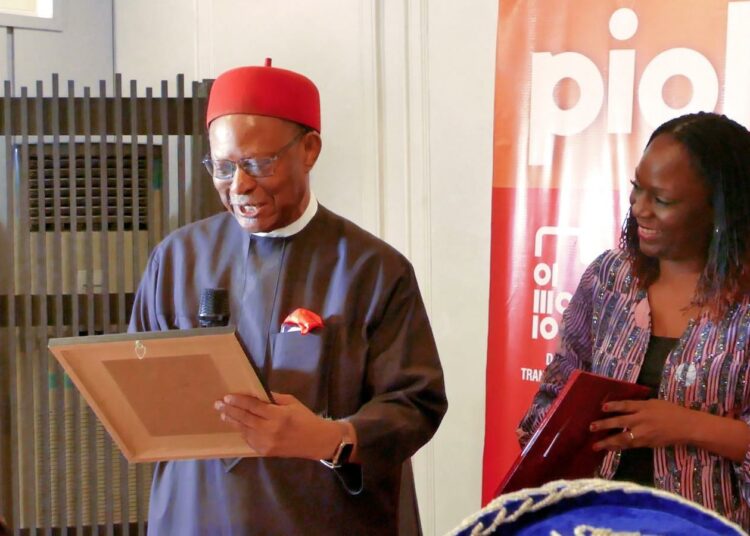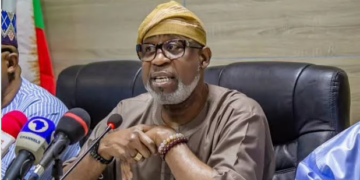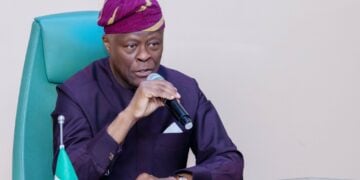At the Piql Africa Breakfast Meeting on Heritage Preservation in Lagos, leading figures in Nigeria’s cultural and historical landscape were recognised for their contributions to safeguarding the nation’s heritage.
The event, which convened policymakers, cultural advocates, academics, corporate leaders, and heritage experts, underscored the urgency of preserving Nigeria’s cultural and historical memory in the face of poor archival infrastructure, inadequate funding, and technological obsolescence.
The Awards for Excellence in Heritage Preservation were presented to individuals and institutions that have demonstrated outstanding commitment to cultural preservation. Chief Emeka Anyaoku, Prof. Wole Soyinka (represented by Jahman Anikulapo), Prince Yemisi Shyllon, First Bank of Nigeria, Evelyn Odigboh, Olugbile Holloway, and the Director-General of the National Commission for Museums and Monuments (in absentia) were among the honourees.
Accepting the award on behalf of Prof. Wole Soyinka, Jahman Anikulapo stressed that cultural preservation is not merely about history but remains central to Nigeria’s identity and future.
The event also saw the announcement of a landmark partnership between Piql West Africa and the National Council for Arts and Culture (NCAC), aimed at digitising and securely storing Nigeria’s cultural heritage using Piql’s state-of-the-art long-term data preservation technology.
Managing Director of Piql Africa Ltd, Esona Onuoha, described the collaboration as a crucial step in bridging Nigeria’s cultural past with its digital future, emphasising that the initiative was not just about data storage but about securing national identity. Chief Executive Officer of Piql AS and the Arctic World Archive (AWA), Rune Bjerkestrand, reaffirmed Piql’s global commitment to preserving cultural heritage through technological innovation.
The event’s keynote speaker and Director-General of NCAC, Ojinnaka Obi Asika, highlighted that cultural memory is more than nostalgia, calling it a form of economic and political power. He pointed out that many African societies had sophisticated knowledge systems long before colonial rule, referencing the Benin Bronzes, the Nok civilisation’s ironworks, and the Nsibidi writing system, which challenge colonial narratives that Africa lacked a written history.
Discussions at the meeting also centred on the deliberate distortion of African history during the transatlantic slave trade and colonial era.
Former Secretary-General of the Commonwealth, Chief Emeka Anyaoku, stressed that reclaiming Nigeria’s true historical narrative required rigorous research and proper archiving. He recounted a personal experience of taking visitors to the National Museum in Lagos, only to find its state deplorable. He lamented the chronic underfunding of Nigeria’s museums and archives, revealing that during his time in government, he secured ₦800 million from the federal government and $2 million from the Ford Foundation for archival preservation. However, he cautioned that such efforts must be institutionalised rather than left to one-off interventions.
Cultural financier Prince Yemisi Shyllon echoed these concerns, warning that without proper documentation of its past, Nigeria cannot transition from an extractive economy to a knowledge-driven one. He noted that other nations were leveraging historical data for artificial intelligence and technological advancements, while Nigeria continued to neglect its archival system. Shyllon detailed his work in digitising Nigeria’s cultural heritage through Google Arts & Culture, which now hosts 31 Nigerian cultural events, including the Ojude Oba Festival, Osun Osogbo Festival, and Eyo Festival.
Addressing historical inaccuracies, Chairman of Piql Africa Ltd, Nze Ed Keazor, revealed that contrary to the widely accepted belief that Flora Shaw coined the name “Nigeria” in 1897, historical records from as early as 1719 reference “Nigeria” in different contexts. He emphasised that archival research is essential to correcting misconceptions and ensuring historical accuracy.
Further highlighting the challenges facing archival institutions, Director of the Nigerian National Archives, Evelyn Odigboh, noted that many significant documents were never submitted for archiving, making them virtually non-existent for future generations. She explained that archives serve a wider audience beyond historians and researchers, listing historical value, administrative relevance, legal significance, and research potential as the four key criteria for determining whether a document qualifies for archiving.
The Igwe of Orlu, Dr. Rick Acholonu, emphasised the role of local communities in preserving cultural identity, while Michel Deleen, Consul of the Kingdom of the Netherlands in Lagos, underscored the importance of international collaboration in archival preservation. Special Assistant to the President on Creativity, Baba Agba, highlighted policy interventions for integrating digital archiving into national development. Chief Executive Officer of the National Theatre, Tola Akerele, stressed the role of the creative industry in cultural sustainability.
Beyond the Piql-NCAC partnership, the event signalled growing corporate interest in heritage preservation, with First Bank Nigeria, Nigeria LNG (NLNG), and Text Nigeria Limited expressing interest in supporting archival initiatives. The participation of the Imo State Economic Summit Group (IESG) further underscored the economic dimension of heritage preservation, with the group exploring ways to align Piql’s initiatives with broader national development goals.
Reflecting on the event’s success, Chief Operating Officer of Piql Nigeria, Sanford Emejuaiwe, stated that the enthusiasm displayed by attendees reaffirmed the urgency of preserving Nigeria’s legacy. Chief Strategy Officer of Piql Nigeria, Emeka Enwere, described the meeting as a benchmark for what can be achieved through collaboration among stakeholders.
The Piql Africa Breakfast Meeting on Heritage Preservation reinforced the need for Nigeria to shift from passive documentation to active integration of heritage preservation into national development strategies. Without structured policies and sustained investment, the country risks losing its cultural and historical memory. However, the Piql-NCAC partnership marks a significant step towards ensuring that Nigeria’s cultural identity is not only preserved but also made accessible for future generations.





